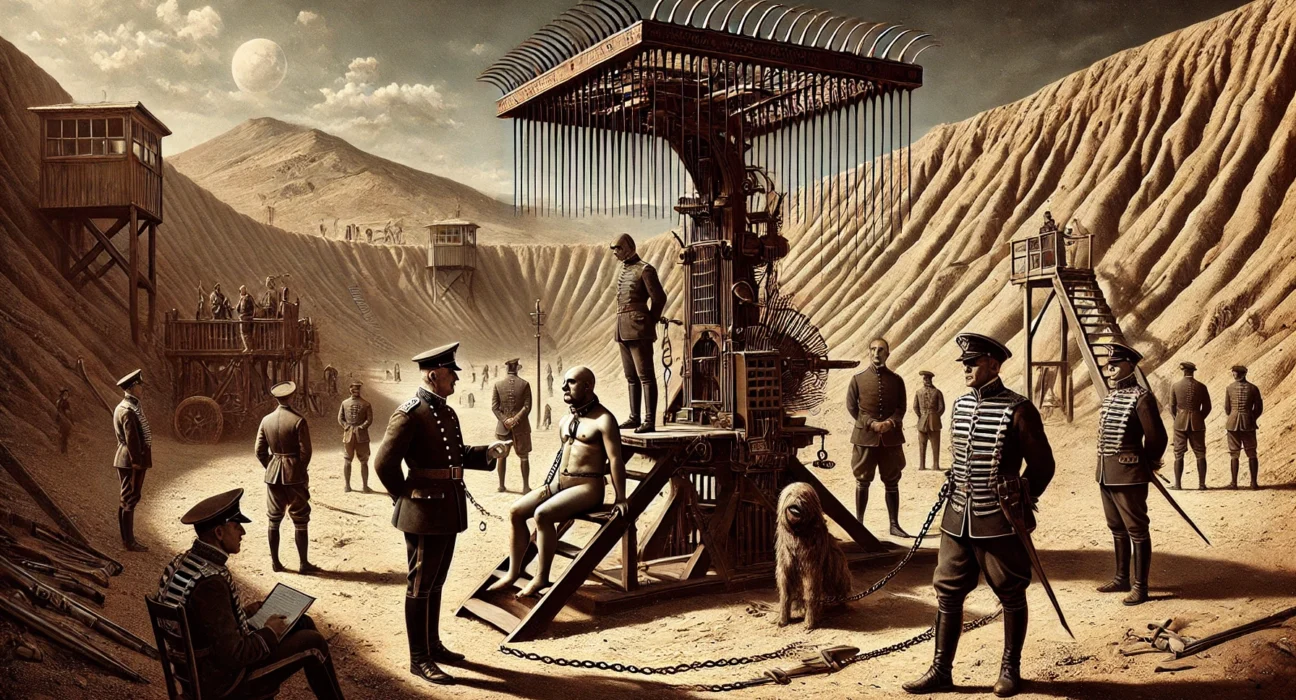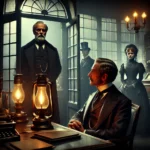In the Penal Colony by Franz Kafka, first published in 1914, is a short story exploring the brutal, inhuman practices of a secluded penal colony. Through the experience of an outsider witnessing an execution using a torturous machine, Kafka critiques authoritarianism, the blind loyalty of the enforcers of outdated laws, and the dark extremes of justice systems. The story is deeply Kafkaesque, reflecting Kafka’s characteristic themes of bureaucracy, helplessness, and moral ambiguity.
Plot Summary
In a secluded penal colony, a Traveler arrives at the invitation of the Commandant, who has arranged for him to observe an execution. As he enters a barren valley enclosed by steep walls, he encounters the Officer, a man deeply devoted to his role as executor of the Commandant’s law. The Officer immediately begins his explanation, guiding the Traveler to an unusual and unsettling device—a complex machine crafted to carry out justice. This “apparatus,” as the Officer calls it with reverence, is designed to inscribe the law that the condemned has broken directly onto his flesh, embedding the crime into the body in a process that is both prolonged and excruciating.
As the Officer describes the machine in almost loving detail, the Traveler watches the Condemned Man, bound and shackled beside him. The man appears dazed and compliant, bearing an air of vacant resignation that hints at his understanding—or lack of it—of his fate. The Officer’s enthusiasm is unwavering as he details the machine’s three primary parts: the Bed, where the condemned lies, the Inscriber, which etches the sentence, and the Harrow, which methodically carves each stroke into the body. The Officer proudly elaborates on the previous Commandant’s brilliance in designing this apparatus, a masterpiece in his eyes, and reveals that the device requires twelve hours to complete its work, allowing the condemned to gradually “understand” his guilt through physical agony.
Intrigued yet disturbed, the Traveler inquires further, learning that the condemned often have no knowledge of their alleged crimes. There are no trials, no defense. The Officer alone judges and sentences, with guilt assumed from the outset. Today’s condemned, a lowly servant, has been sentenced for failing to salute his captain on the hour—a trivial offense to the Traveler’s mind, but the Officer dismisses his concerns. Justice, he asserts, lies in the experience the machine provides, in the visceral revelation of guilt during those agonizing hours on the Bed.
The condemned man, observing the interaction, seems to sense a potential ally in the Traveler and repeatedly glances toward him. The Officer is too absorbed in his fervent lecture to notice these silent pleas, as he busily demonstrates the machine’s parts, adjusting gears and tightening screws, fully focused on ensuring the flawless execution he envisions. When he gestures for the Traveler to inspect the fine needles of the Harrow, the condemned man follows suit, craning his neck, his curiosity momentarily overriding his resignation. The Officer quickly scolds him back into place, treating him with the same detached authority he extends to the machine itself, whose faults and repairs seem, to him, more significant than the condemned’s life.
The Officer, sensing the Traveler’s disapproval, grows anxious. He confides in him that the colony’s current Commandant disapproves of the old ways, and while the Officer has fought to keep this execution process intact, he fears it may soon be abolished. His voice quivers as he speaks of former days when crowds filled the valley, captivated by the spectacle, and he bitterly contrasts this grandeur with the somber solitude of the impending execution. Although his loyalty to the old Commandant’s legacy is unshakable, he realizes that he stands alone in defending it, his followers having long since faded or turned against him.
Desperate, the Officer pleads with the Traveler to support his cause, convinced that an endorsement from a respected outsider could sway the Commandant. But the Traveler remains unyielding, disturbed by the machine and the cold efficiency with which it metes out punishment. With a simple “No,” he seals his decision, rejecting any role in advocating for this brutal system. He speaks honestly of his unease, acknowledging that while he will inform the Commandant of his observations, he has no intention of upholding such a merciless tradition.
Realizing the finality of the Traveler’s words, the Officer turns to the machine with newfound purpose. In a swift, silent ritual, he releases the condemned man, dismissing him and the Soldier from the apparatus. The condemned, bewildered but wary, steps back, watching in astonishment as the Officer begins stripping off his own uniform, removing each piece with a reverent finality. The Officer’s transformation from enforcer to condemned is seamless and determined. Naked, he assumes the position on the Bed, lying face down with stoic composure, his eyes calm, fixed on some unseen point of honor as he straps himself in, now the sole subject of his beloved machine.
The Traveler, alongside the condemned man and the Soldier, stands as witness. The Officer activates the machine himself, setting the Inscriber into motion. But something has changed. The apparatus, worn and in disrepair, fails to perform as it once did. Rather than delicately inscribing, the needles plunge violently into his flesh, tearing and stabbing rather than etching the sentence that should have unfolded over hours. The bed shudders, malfunctioning, and soon the Inscriber begins to collapse as gears and parts spill from it, clanking to the ground. The Officer’s face shows none of the enlightenment he spoke of, only silent pain, his body slumped and impaled by the malfunctioning machine.
The Traveler, horrified, steps forward, feeling a strange duty to save the Officer’s body from further defilement. He attempts to remove him from the machine, but it clings to its victim, the needles piercing the flesh too deeply. Even as the harrow finally falls silent, the Officer’s corpse remains ensnared, a tragic testament to the machine’s utter failure to grant the meaning it once promised.
Dispirited, the Traveler leaves the valley, followed by the condemned man and the Soldier, who, perhaps inspired by this strange turn of events, seem to seek his companionship. They guide him to a low building in the colony—a tea house—that holds a peculiar, unmarked grave, a stone inscribed with an ominous prophecy: the old Commandant buried here is fated to rise again and restore his rule. Skeptical and weary, the Traveler declines to linger, leaving coins for the men who gather around him with a mix of curiosity and reverence. He moves past them, resolute in his decision to leave this forsaken place.
At the harbor, the Traveler prepares to board his boat when he sees the condemned man and the Soldier running after him. They approach with wordless urgency, appearing desperate to leave the colony with him, but the Traveler waves them off, signaling his resolve to depart alone. He watches as they stop on the dock, hopeful but held back, as the boat slowly pulls away. Behind him, the distant figure of the penal colony fades from view, leaving behind a world of archaic justice and unending despair.
Main Characters
- The Traveler: A visitor from Europe and the story’s moral compass, he is invited to observe the execution and remains largely silent. Skeptical of the justice system he observes, he ultimately confronts the inhumanity of the machine.
- The Officer: An enthusiastic supporter of the penal colony’s brutal execution apparatus, he believes deeply in the justice system created by the Old Commandant. The Officer’s dedication leads him to a tragic and revealing end.
- The Condemned Man: A silent and passive character sentenced to death without knowing his crime. His ignorance and powerlessness underscore the brutal efficiency of the penal system.
- The Soldier: A passive figure who assists the Officer in controlling the Condemned Man. He mirrors the blind obedience expected in the penal colony, reflecting his detachment from the morality of his actions.
Theme
- The Inhumanity of Bureaucracy: The story critiques impersonal systems of authority, particularly in how justice is administered without regard for individual dignity or humanity. The Officer’s unwavering commitment to an outdated and cruel device symbolizes the cold, dehumanizing power of bureaucratic systems.
- Justice vs. Cruelty: Kafka examines the nature of justice, portraying the penal colony’s notion of justice as twisted and sadistic. The Officer insists the machine reveals “truth” to the condemned through suffering, exposing the grotesque distortions of justice under authoritarian regimes.
- Blind Obedience and Tradition: Loyalty to the past, especially embodied in the Officer’s attachment to the previous Commandant’s practices, represents the dangers of adherence to tradition without question, often leading to moral decay and loss of personal agency.
- Isolation and Alienation: Both physically and ideologically isolated, the penal colony serves as a microcosm of Kafka’s world, where individuals confront oppressive systems alone and feel alienated from any societal empathy or intervention.
Writing Style and Tone
Kafka’s writing style in In the Penal Colony is dense, richly descriptive, and unflinchingly clinical. His language gives a surreal, almost hypnotic quality to the scenes, emphasizing the absurdity and horror of the execution apparatus. Kafka’s intricate descriptions of the machine reveal a fascination with the grotesque; each component of the machine is dissected in detail, giving readers both insight and discomfort. This meticulously cold description amplifies the underlying dread that permeates the narrative, allowing readers to experience the visceral impact of the machine’s brutality.
The tone is profoundly unsettling and darkly ironic, as Kafka uses the Officer’s zealous admiration for the execution machine to critique systems that claim to uphold justice while enacting cruelty. The interaction between the Traveler and the Officer, marked by a growing tension and discomfort, highlights the clash between detached European rationalism and the passionate, almost religious fervor of the Officer. Kafka’s tone suggests an inevitable tragedy and moral ambiguity, leaving the reader with a haunting reflection on justice and the lengths humanity goes to in its name.
We hope this summary has sparked your interest and would appreciate you following Celsius 233 on social media:
There’s a treasure trove of other fascinating book summaries waiting for you. Check out our collection of stories that inspire, thrill, and provoke thought, just like this one by checking out the Book Shelf or the Library
Remember, while our summaries capture the essence, they can never replace the full experience of reading the book. If this summary intrigued you, consider diving into the complete story – buy the book and immerse yourself in the author’s original work.
If you want to request a book summary, click here.
When Saurabh is not working/watching football/reading books/traveling, you can reach him via Twitter/X, LinkedIn, or Threads
Restart reading!








